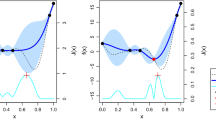Abstract
In this paper, an approach for reducing the graphical model and a genetic algorithm for computing the approximate Nash equilibrium in a static multi-agent game is studied. In order to describe the relationship between strategies of various agents, the concepts of the influence degree and the strategy dependency are presented. Based on these concepts, an approach for reducing a graphical model is given. For discretized mixed strategies, the relationship between the discrete degree and the approximate degree is developed. Based on the regret degree, a genetic algorithm for computing the approximate Nash equilibrium is given. Experimental results indicate the genetic algorithm has high efficiency and few equilibrium errors.
Similar content being viewed by others
References
Von Neumann, J., Morgenstern, O.: Theory of Games and Economics Behavior. Princeton University Press, Princeton (1944)
Nash, J.F.: Non-cooperative games. Ann. Math. 54(2), 286–295 (1951)
Parsons, S., Gmgtrasiewicz, P., Wooldridge, M.: Game Theory and Decision Theory in Agent-Based Systems, vol. 5. Kluwer, The Netherlands (2000)
Wooldridge, M.: An Introduction to Multi-agent Systems. John Wiley and Sons Inc, New York (2002)
Kearns, M., Littman, M.L., Singh, S.: Graphical models for game theory. In: Proceedings of the 17th Conference in Uncertainty in Artificial Intelligence, University of Washington, Seattle, Washington, pp. 253–260. Morgan Kaufmann, San Mateo (2001)
Pawlak, Z.: Rough sets. Int. J. Comput. Inf. Sci. 11(5), 341–356 (1982)
Ziarko, W.: The discovery, analysis and representation of data dependency in databases. In: Piatetsky-Shapiro, G. (ed.) Knowledge Discovery in Databases, pp. 213–228. Benjamin/Cummings, Menlo Park (1991)
Liu, Q.: Rough Sets and Rough Reasoning. Science Press, Beijing (2001)
Axelrod, R.: The evolution of strategies in the iterated prisoner’s dilemma. In: Davis, L. (ed.) Genetic Algorithms and Simulated Annealing, pp. 32–41. Pitman, London (1987)
Mckelvey, R.D., Mclennan, A.: Computation of equilibria in finite games. In: Amman, J.R.H. (ed.) Handbook of Computational Economics, vol. 1, pp. 87–142. Elsevier (1996)
Lemke, C., Howson, J.: Equilibrium points of bimatrix games. J. Soc. Ind. Appl. Math. 12, 413–424 (1964)
Wilson, R.: Computing simply stable equilibria. Econometrica 60, 1039–1070 (1992)
Blum, B., Shelton, C.R., Koller, D.: A continuation method for Nash equilibria in structured games. Available at http://dags.stanford.edu/games/ijcai03.pdf/2003 (2003)
Koller, D., Milch, B.: Multi-agent influence diagrams for representing and solving games. In: Proceedings of the 17th International Joint Conference on Artificial Intelligence, Seattle, Washington, August 2001, pp. 1027–1036. Morgan Kaufmann, San Mateo (2001)
Holland, J.H.: Adaptation in Natural and Artificial Systems. University of Michigan Press, Michigan (1975)
Goldberg, D.E.: Genetic Algorithms in Search, Optimization, and Machine Learning. Addison-Wesley, Reading (1989)
Fudenberg, D., Levine, D.K.: The Theory of Learning in Games. MIT Press, Cambridge (1998)
Liu, W., Li, J., Yue, K., Song, N.: An approach for solving fuzzy games. Int. J. Uncertain. Fuzziness Knowl.-Based Syst. 14(3), 272–292 (2006)
Vickrey, D., Koller, D.: Multi-agent algorithms for solving graphical games. In: Proceedings of AAAI Conference, Edmonton, Alberta, Canada, pp. 345–351. AAAI Press, Cambridge (2002)
Author information
Authors and Affiliations
Corresponding author
Additional information
This work was supported by the National Natural Science Foundation of China (No. 60763007, 60933001), the Natural Science Foundation of Yunnan Province No. 2007F009M, 2008CD083), the Research Foundation of the Educational Department of Yunnan Province (08Y0023), the Research Foundation of Yunnan University (No. 2009F32Q).
Rights and permissions
About this article
Cite this article
Liu, WY., Yue, K., Li, J. et al. An Approach for Reducing the Graphical Model and Genetic Algorithm for Computing Approximate Nash Equilibrium in Static Games. J Intell Robot Syst 60, 241–261 (2010). https://doi.org/10.1007/s10846-010-9419-6
Received:
Accepted:
Published:
Issue Date:
DOI: https://doi.org/10.1007/s10846-010-9419-6




